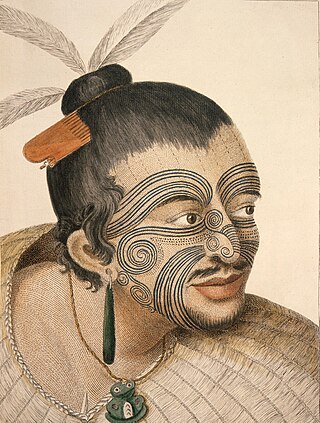| Youth rights |
|---|
| Rights |
|---|
 |
| Theoretical distinctions |
| Human rights |
| Rights by beneficiary |
| Other groups of rights |
This article gives an outline of age restrictions.
| Youth rights |
|---|
| Rights |
|---|
 |
| Theoretical distinctions |
| Human rights |
| Rights by beneficiary |
| Other groups of rights |
This article gives an outline of age restrictions.


Retirement is the withdrawal from one's position or occupation or from one's active working life. A person may also semi-retire by reducing work hours or workload.

A tattoo is a form of body modification made by inserting tattoo ink, dyes, and/or pigments, either indelible or temporary, into the dermis layer of the skin to form a design. Tattoo artists create these designs using several tattooing processes and techniques, including hand-tapped traditional tattoos and modern tattoo machines. The history of tattooing goes back to Neolithic times, practiced across the globe by many cultures, and the symbolism and impact of tattoos varies in different places and cultures.

A pension is a fund into which a sum of money is added during an employee's employment years and from which payments are drawn to support the person's retirement from work in the form of periodic payments. A pension may be a "defined benefit plan", where a fixed sum is paid regularly to a person, or a "defined contribution plan", under which a fixed sum is invested that then becomes available at retirement age. Pensions should not be confused with severance pay; the former is usually paid in regular amounts for life after retirement, while the latter is typically paid as a fixed amount after involuntary termination of employment before retirement.

In the United States, Social Security is the commonly used term for the federal Old-Age, Survivors, and Disability Insurance (OASDI) program and is administered by the Social Security Administration (SSA). The original Social Security Act was enacted in 1935, and the current version of the Act, as amended, encompasses several social welfare and social insurance programs.
Irezumi is the Japanese word for tattoo, and is used in English to refer to a distinctive style of Japanese tattooing, though it is also used as a blanket term to describe a number of tattoo styles originating in Japan, including tattooing traditions from both the Ainu people and the Ryukyuan Kingdom.

The age of majority is the threshold of legal adulthood as recognized or declared in law. It is the moment when minors cease to be considered such and assume legal control over their persons, actions, and decisions, thus terminating the control and legal responsibilities of their parents or guardian over them. Most countries set the age of majority at 18, but some jurisdictions have a higher age and others lower. The word majority here refers to having greater years and being of full age as opposed to minority, the state of being a minor. The law in a given jurisdiction may not actually use the term "age of majority". The term typically refers to a collection of laws bestowing the status of adulthood. Those under the age of majority are referred to as minors and may be legally denied certain privileges or rights.

The Royal Edinburgh Military Tattoo is an annual series of military tattoos performed by British Armed Forces, Commonwealth and international military bands, and artistic performance teams on the Esplanade of Edinburgh Castle in the capital of Scotland. The event is held each August as one of the Edinburgh Festivals.
Mandatory retirement also known as forced retirement,enforced retirement or compulsory retirement, is the set age at which people who hold certain jobs or offices are required by industry custom or by law to leave their employment, or retire.

Samoans or Samoan people are the indigenous Polynesian people of the Samoan Islands, an archipelago in Polynesia, who speak the Samoan language. The group's home islands are politically and geographically divided between the Independent State of Samoa and American Samoa, an unincorporated territory of the United States of America. Though divided by national border, the culture and language are the same.

Norman Keith Collins, known popularly as Sailor Jerry, was a prominent American tattoo artist in Hawaii who was well known for his sailor tattoos.

A tattoo artist is an individual who applies permanent decorative tattoos, often in an established business called a "tattoo shop", "tattoo studio" or "tattoo parlour". Tattoo artists usually learn their craft via an apprenticeship under a trained and experienced mentor.

Tā moko is the permanent marking or "tattoo" as traditionally practised by Māori, the indigenous people of New Zealand. It is one of the five main Polynesian tattoo styles.

Tattooing has been practiced across the globe since at least Neolithic times, as evidenced by mummified preserved skin, ancient art and the archaeological record. Both ancient art and archaeological finds of possible tattoo tools suggest tattooing was practiced by the Upper Paleolithic period in Europe. However, direct evidence for tattooing on mummified human skin extends only to the 4th millennium BC. The oldest discovery of tattooed human skin to date is found on the body of Ötzi the Iceman, dating to between 3370 and 3100 BC. Other tattooed mummies have been recovered from at least 49 archaeological sites, including locations in Greenland, Alaska, Siberia, Mongolia, western China, Egypt, Sudan, the Philippines and the Andes. These include Amunet, Priestess of the Goddess Hathor from ancient Egypt, multiple mummies from Siberia including the Pazyryk culture of Russia and from several cultures throughout Pre-Columbian South America.
Parental consent laws in some countries require that one or more parents consent to or be notified before their minor child can legally engage in certain activities.

The Survey of Health, Ageing and Retirement in Europe (SHARE) is a multidisciplinary and cross-national panel database of micro data on health, socio-economic status and social and family networks. In seven survey waves to date, SHARE has conducted approximately 380,000 interviews with about 140,000 individuals aged 50 and over. The survey covers 28 European countries and Israel.

The Tattooing of Minors Act 1969 is an Act of Parliament of the Parliament of the United Kingdom. It gained Royal Assent on 16 May 1969, and is currently in force.
In the United States there is no federal law regulating the practice of tattooing. However, all 50 states and the District of Columbia have statutory laws requiring a person receiving a tattoo be at least 18 years old. This is partially based on the legal principle that a minor cannot enter into a legal contract or otherwise render informed consent for a procedure. Most states permit a person under the age of 18 to receive a tattoo with permission of a parent or guardian, but some states prohibit tattooing under a certain age regardless of permission, with the exception of medical necessity.

Lesbian, gay, bisexual, and transgender (LGBT) persons in the Marshall Islands may face legal challenges not experienced by non-LGBT residents. Same-sex sexual activity has been legal in the Marshall Islands since 2005, and discrimination on the basis of sexual orientation and gender identity has been outlawed in all areas since 2019. Despite this, households headed by same-sex couples are not eligible for the same legal protections available to opposite-sex married couples, as same-sex marriage and civil unions are not recognized.
Legislation controlling tattooing varies among countries in Europe. In many countries there is no particular legislation. In countries that do have legal controls, they relate mainly to the minimum age of clients. Greece and Denmark impose further stipulations.
The position of Officer in Charge (OIC) in the context of Philippine governance refers to an official serving their position in an interim or temporary basis or even as the Caretaker or Custodian of the office. The position of OIC is distinct to an official serving in an "Acting" capacity.